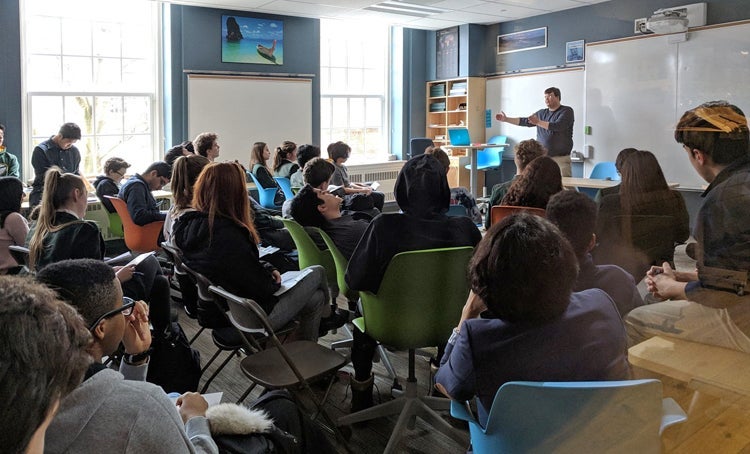Cheriton School of Computer Science Professor Florian Kerschbaum spoke about cybersecurity, privacy and ethics in the age of machine learning and artificial intelligence to high school students at the 2019 World Affairs Conference, held this year on February 4 to 5, 2019 in Toronto.
As an invited speaker at a conference plenary titled Data Daycare, Professor Kerschbaum and colleague Arvind Gupta from the University of Toronto’s Department of Computer Science explored trends in big data and artificial intelligence their implications.

Professor Florian Kerschbaum (at whiteboard) speaks to high school students at 2019 World Affairs Conference
Professor Kerschbaum spoke to students about the risks of data sharing and artificial intelligence, emphasizing that re-occuring headlines of data breaches in government, hospitals and companies demonstrate the difficulty in protecting our online data.
“It is important to understand that once data is in the hands of people we don’t trust, we can no longer ensure that the ethical considerations for the use of AI we came up with are observed,” Professor Kerschbaum said. “While in the normal course of business, ethical considerations are important to guide law and our actions, they do not protect against people who work outside the law and in other nations. It is prudent therefore that along with the very important ethical principles we develop, we also have tools to protect our data against malicious abuse.”
Professor Kerschbaum then shared some principles to help protect our online data.
“First, students should think about which online information to trust and act upon — to think before they click,” he said, adding that the profiles built from the data we share everyday enable targeted information generated by AI to sway opinions and influence our actions.
“This may be mostly innocent to keep us playing an online game — for example, providing targeted prompts to keep us interested — but it can be imagined to extend to influence decisions and undermine a country's democracy. It is essential to be careful when sharing data online and to consider with whom you are sharing it, since shared data cannot be reliably recovered. It is technically infeasible to enforce deletion. Students also need to be aware that they often share data implicitly with service providers.”
The World Affairs Conference is Canada’s oldest annual student-run current affairs conference. Held annually at Upper Canada College in Toronto, Canada, the World Affairs Conference connects more than 1,000 students, with a common interest in current affairs, from across North America.